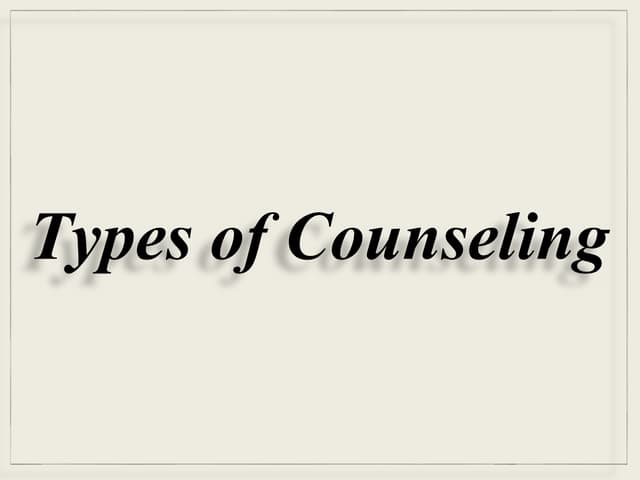How to Strengthen Intimacy Through couples counselling
Wiki Article
A Comprehensive Guide to the Different Kinds Of Therapy and Their Influence
Therapy incorporates a selection of restorative strategies, each designed to fulfill distinct psychological wellness needs. From the organized techniques of Cognitive-Behavioral Therapy to the empathetic nature of Person-Centered Treatment, these methods supply distinctive paths to personal growth. Family treatment and Dialectical Behavior Treatment provide added structures for recovery, while group counseling cultivates neighborhood support. Understanding these varied approaches can brighten their profound influence on specific health. What stays to be explored are the intricacies of each approach.
Understanding Cognitive-Behavioral Therapy (CBT)
Although many restorative approaches exist, Cognitive-Behavioral Therapy (CBT) stands apart as a result of its structured, ambitious nature. This type of therapy is based on the property that thoughts, feelings, and actions are interconnected, and by altering adverse thought patterns, individuals can modify their emotional actions and activities. CBT employs different methods, such as cognitive restructuring, which aids clients determine and test altered ideas. Behavior activation motivates interaction in pleasurable activities to fight clinical depression.Generally, CBT is a temporary therapy, usually lasting between 12 to 20 sessions, making it easily accessible for those looking for fast results. Its effectiveness has been well-documented in dealing with stress and anxiety conditions, depression, and various other psychological health issues. The specialist's function is to guide customers with exercises and homework assignments, cultivating self-awareness and advertising lasting coping strategies. This practical approach empowers individuals to take control of their psychological health, inevitably leading to enhanced life complete satisfaction.
Discovering Person-Centered Therapy
Person-Centered Treatment, developed by Carl Rogers, offers a different approach to Cognitive-Behavioral Treatment by highlighting the customer's subjective experience. This restorative version focuses on the individual's viewpoint, fostering a setting of empathy, genuine favorable regard, and authenticity. By allowing clients to discover their sensations and ideas without judgment, therapists facilitate individual growth and self-discovery.The core tenet of Person-Centered Therapy is the belief that people have the inherent capability for self-healing and individual advancement. In this setup, the therapist acts as an encouraging guide instead of a regulation authority, urging customers to take fee of their own trip. This strategy is particularly efficient for those coming to grips with concerns such as low self-worth, anxiety, or clinical depression, as it encourages them to challenge and understand their emotions. Eventually, Person-Centered Therapy cultivates a strong restorative alliance, promoting trust fund and openness crucial for meaningful adjustment.
The Function of Family Members Treatment in Recovery
Family members treatment works as a vital element in the recovery procedure for people and their partnerships. This restorative strategy concentrates on enhancing communication, resolving conflicts, and cultivating much deeper links among household members. By resolving dysfunctional characteristics, family treatment motivates each participant to express their ideas and feelings in a secure atmosphere, promoting understanding and compassion.
The influence of family treatment extends beyond the sessions, as improved relationships can lead to improved emotional wellness for all entailed. On the whole, family therapy plays an essential duty in healing by cultivating unity, strength, and mutual support among member of the family, eventually leading them towards a much healthier, much more satisfying life together.
Unpacking Dialectical Behavior Modification (DBT)
Structure on the structure of therapeutic methods that improve psychological health, Dialectical Behavior modification (DBT) offers a structured framework for people fighting with intense emotions and behavioral challenges. Established by Marsha Linehan, DBT integrates cognitive-behavioral techniques with mindfulness practices, aiming to assist customers handle overwhelming sensations and improve social effectiveness.The treatment is especially valuable for those diagnosed with Borderline Personality Condition but is likewise appropriate to a series of various other mental health and wellness concerns. low cost therapy. DBT includes specific treatment sessions and skills training groups, focusing on 4 crucial capability: mindfulness, distress tolerance, feeling regulation, and social performance
The Advantages of Team Counselling Sessions
While specific treatment provides useful understandings, team therapy sessions supply unique benefits that can considerably boost the therapeutic experience. One essential benefit is the feeling of neighborhood that emerges amongst participants. People usually find comfort in sharing their experiences with others encountering similar obstacles, fostering a supportive environment that minimizes sensations of isolation.Team sessions encourage varied point of views, allowing participants to discover from each various other's coping techniques and insights. This cumulative knowledge can lead to improved analytic capabilities and a more comprehensive understanding of personal issues.
In addition, group counseling usually advertises liability, as members encourage each other to seek their objectives and abide by their dedications. Lastly, the cost-effectiveness of group therapy makes it an available alternative for several people looking for assistance. Generally, the collective nature of team therapy sessions can considerably enhance the restorative trip.
Regularly Asked Inquiries
What Credentials Do Therapists Required to Practice Counseling?
Therapists generally call for a relevant degree in psychology or counseling, in addition to supervised professional experience. Furthermore, they need to get ideal licensure or qualification to exercise lawfully, making sure adherence to specialist criteria and honest guidelines.Exactly how Do I Choose the Right Kind Of Treatment for Me?
Selecting the appropriate sort of therapy involves evaluating personal needs, exploring numerous approaches, considering specialist specialties, and looking for suggestions. Comprehending individual goals and preferences can considerably enhance the efficiency and contentment of the restorative experience.
Are Online Counseling Sessions as Effective as In-Person Ones?
The efficiency of on-line therapy sessions contrasted to in-person ones commonly depends upon private preferences and circumstances. Research indicates that both methods can generate favorable end results, though some may locate higher convenience in face-to-face interactions.For How Long Does Therapy Usually Last?

What Should I Anticipate During My Very First Counseling Session?
During the very first therapy session, clients can anticipate an intro, discussion of their issues, establishment of goals, and a review of the therapy procedure - adhd counselling. This first conference intends to build connection and assurance convenienceReport this wiki page